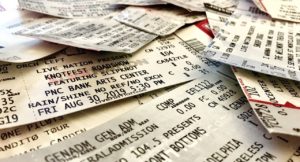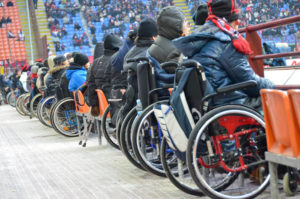By: Eric Anderson
Purchasing tickets for concerts or other events isn’t just challenging and frustrating for Taylor Swift fans, people with disabilities are all too familiar with the problematic process of buying tickets for a show through Ticketmaster, Live Nation, and other ticket vendors. Obtaining wheelchair accessible seats to a concert is an incredibly arduous and painstakingly, tiresome operation for a disabled individual. What makes this issue even more maddening, is that the laws and protections established to ensure people with disabilities have access to accessible seats at concert venues are completely ignored by ticket sellers like Ticketmaster and its parent company Live Nation. While Ticketmaster’s website explicitly states that individuals without a disability cannot purchase wheelchair accessible seats, there is absolutely no verification process in place to prevent able-bodied individuals from buying accessible seating. Ticketmaster says that those that abuse the policy can have their tickets canceled; however, this practice is rarely if ever enforced. Complicating matters further, wheelchair accessible seats are typically reserved once tickets are made available to purchase to the public. But if tickets are in high demand and sell out quickly, then wheelchair accessible seats are immediately made available to the public, even though Ticketmaster states that people without disabilities cannot purchase accessible seats. In fact, there’s essentially direct contradictions in the ADA laws and policies encompassing wheelchair accessible tickets. For example, the law states that venues are required to sell tickets for accessible seats in the same manner and under the same conditions as all other ticket sales, basically rendering the protections for accessible seats useless. If the conditions that are applied to purchasing wheelchair accessible tickets are the same as every other ticket, then there are virtually no safeguards. Additionally, once third-party ticket vendors are included then the ADA laws become even more eroded. Adding to the problem is the ability of ticket bots, or automated software used to purchase tickets in bulk for resale at significantly higher prices. In most markets, over 40% of all online ticket booking is done by bots even though there are existing laws in place to prevent this practice. These bots do not discriminate – they gobble up every seat available to purchase, even wheelchair accessible tickets.

What Does the Law Say?
People with mobility disabilities who require accessible seating because of their disability are permitted to purchase tickets for accessible seats. This group includes people who use wheelchairs, those who use other mobility devices, and people who cannot climb steps or walk long distances. Tickets for accessible seats may be sold to individuals who require accessible seating themselves or to someone purchasing on their behalf. Venues cannot charge higher prices for accessible seats than for non-accessible seats in the same seating section. Venues must generally offer accessible seats in all price categories available to the public. Under the Americans with Disabilities Act (ADA), a public accommodation venue must remove such architectural barriers where doing so is readily achievable. A public entity venue generally must make its programs, services, and activities accessible to individuals with disabilities, such as by providing accessible seating, unless it can demonstrate that doing so would result in undue hardship. People purchasing a ticket for an accessible seat may purchase up to three additional seats for their companions in the same row and these seats must be contiguous with the accessible seat. Accessible seats may be used as companion seats. If contiguous seats have already been sold and are not available, the venue must offer other seats as close as possible to the accessible seat. However, venues or ticket sellers cannot require proof of disability as a condition for purchasing tickets for accessible seats. They may take steps to prevent the fraudulent sale and use of accessible seating, like asking purchasers to state that they have a disability that requires, or they are purchasing tickets for someone who has a disability that requires, the features of an accessible seat, but this policy is rarely practiced or implemented by venues or ticket vendors and wholesalers.
How to Obtain an Accessible Seat?

First, it’s important to know the ADA clearly states that a concert venue must provide an elevated, unobstructed view to people in wheelchairs. Therefore, if wheelchair accessible tickets are unavailable to purchase or sold out, then buy a GA (General Admission) ticket available anywhere in the venue, even if the seats are in the nose-bleed section. Upon arriving at the venue visit Guest Services and request wheelchair accessible seats, the venue must make accommodation and provide you with accessible seating. Fortunately, many times this results in getting a better seat than if you purchased wheelchair accessible tickets directly. Secondly, if possible, purchase wheelchair seats straight from the box-office immediately after tickets go on-sale to the public. Not only will you avoid all the annoying and numerous taxes and added fees attached to tickets by Ticketmaster and other third-party sellers, but you’ll also almost assuredly secure an accessible seat at the venue. Thirdly, if it’s within your budget, purchase VIP tickets. While these tickets are typically more expensive, they do come with many perks and advantages not available to GA or wheelchair accessible seats. VIP seats are generally unobstructed, spacious, located near restrooms and concessions, and easily accessible by wheelchair. Most importantly, always advocate for yourself and remind the venue of your rights and protections afforded to you under the ADA.


